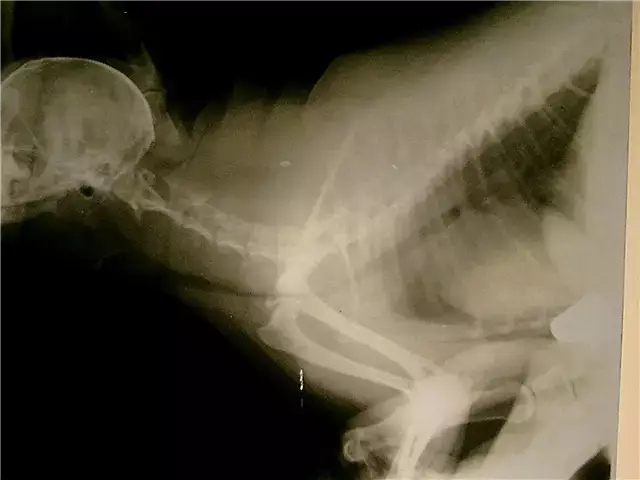- Author Rachel Wainwright [email protected].
- Public 2023-12-15 07:39.
- Last modified 2025-11-02 20:14.
Antistrumin-Darnitsa
Instructions for use:
- 1. Release form and composition
- 2. Indications for use
- 3. Contraindications
- 4. Method of application and dosage
- 5. Side effects
- 6. Special instructions
- 7. Drug interactions
- 8. Terms and conditions of storage

Antistrumin-Darnitsa is a drug used for the treatment and prevention of iodine deficiency conditions and thyroid diseases.
Release form and composition
Dosage form of release of Antistrumina-Darnitsa - tablets: flat-cylindrical, almost white or white with a yellowish tinge, with a chamfer (10 pcs. In blisters, 5 or 10 packs in a cardboard box).
Composition of 1 tablet:
- active substance: potassium iodide - 1 mg;
- auxiliary components: crystalline sugar, calcium stearate.
Indications for use
- iodine deficiency (prevention of development);
- diffuse euthyroid goiter (treatment);
- iodine-deficient (endemic) goiter after surgical removal, as well as after the completion of complex therapy with thyroid hormone preparations (prevention of relapse).
Contraindications
- hemorrhagic diathesis;
- pulmonary tuberculosis;
- overt hyperthyroidism;
- the use of potassium iodide in a daily dose of more than 0.3-1 mg of iodine in case of autonomous adenoma, focal and diffuse autonomous foci of the thyroid gland, except for preoperative iodine therapy for thyroid blockade according to Plummer;
- the use of potassium iodide in a daily dose of above 0.15 mg of iodine in latent hyperthyroidism;
- Dühring's dermatitis herpetiformis (Dühring-Brock syndrome);
- age up to 12 years;
- pregnancy and lactation;
- hypersensitivity to the components of the drug.
Method of administration and dosage
Antistrumin-Darnitsa is taken orally. In order to prevent irritation of the mucous membrane of the digestive tract, it is recommended to drink the drug with milk, sweet tea or jelly.
The scheme of application of Antistrumina-Darnitsa is determined by the doctor individually.
For prevention, the drug is prescribed 1 tablet 1 time in 7 days. The tablet should be taken with plenty of liquid. It is possible to conduct a long course (up to several years).
The daily dose for the treatment of diffuse forms of goiter is 1 tablet, the frequency of administration is 2-3 times every 7 days. The average course duration is 6-12 months or more.
Side effects
- cardiovascular system: tachycardia;
- endocrine system: when taking high doses of the drug - goiter, hypothyroidism in the treatment of goiter in adults (in a daily dose of 0.3-1 mg of iodine), in some cases, iodine-induced hyperthyroidism may occur. The most common cause of this disorder is diffuse or limited areas of thyroid autonomy. The most at risk are elderly patients suffering from goiter for a long time;
- nervous system and psyche: irritability, tremors, sleep disturbances;
- immune system, skin and subcutaneous tissue: hypersensitivity reactions, including iodine-induced rhinitis, tuberous / bullous iododerma, angioedema, exfoliative dermatitis, swelling of the salivary glands, fever, acne, increased sweating;
- digestive system: discomfort in the epigastrium, diarrhea;
- blood and lymphatic system: eosinophilia;
- others: manifestations of iodism (in the form of "iodine" fever, urticaria, edema of the nasal mucosa, "iodine" acne, skin rash, Quincke's edema, itching, anaphylactic shock).
As a rule, when using Antistrumina-Darnitsa for prophylactic purposes in patients of all ages and for therapeutic purposes in children, the development of adverse reactions is not observed. However, it is impossible to completely exclude the occurrence of pronounced hyperthyroidism in the presence of large foci of thyroid autonomy when taking iodine in daily doses above 0.15 mg.
special instructions
When prescribing Antistrumina-Darnitsa, children need medical monitoring of their condition.
With renal failure, hyperkalemia may develop.
Patients with diabetes mellitus should take into account that crystalline sugar is included in the drug as an additional component.
It is recommended to avoid the use of the drug when treating with radioactive iodine, if you suspect / have thyroid cancer.
Antistrumin-Darnitsa should not be used for hypothyroidism, unless hypothyroidism is associated with iodine deficiency.
Drug interactions
Antistrumin-Darnitsa prevents the penetration of unstable iodine isotopes into the thyroid tissue.
Iodine deficiency increases, and excess decreases the response to the use of thyrostatic agents in the treatment of hyperthyroidism, therefore, before / during therapy of hyperthyroidism, any use of iodine should be avoided if possible.
For their part, thyrostatic agents help to inhibit the transition of iodine to organic compounds in the thyroid gland, thus causing goiter formation.
With the combined use of Antistrumina-Darnitsa with certain drugs / substances, the following effects may develop:
- substances, the penetration of which into the thyroid gland occurs by the same capture mechanism as iodine (for example, perchlorate), as well as substances that are not transported themselves (for example, thiocyanate): competitive suppression of the absorption of iodine by the thyroid gland;
- lithium salts (with higher doses of Antistrumina-Darnitsa): development of goiter and hypothyroidism;
- quinidine: increased action on the heart (due to an increase in plasma potassium concentration);
- vegetable alkaloids and heavy metal salts: the formation of an insoluble precipitate and the complication of iodine absorption;
- potassium-sparing diuretics (with higher doses of Antistrumin-Darnitsa): development of hyperkalemia.
Terms and conditions of storage
Store in its original packaging, out of reach of children at temperatures up to 25 ° C.
Shelf life is 4 years.
Information about the drug is generalized, provided for informational purposes only and does not replace the official instructions. Self-medication is hazardous to health!






